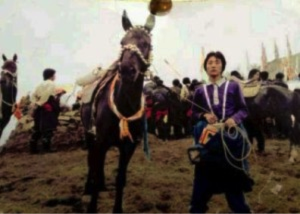Name: Tsering Tashi
Age: 22
Sex: Male
Status: Layperson
Date of Self-immolation: 12 January 2013, 8 pm (local time)
Location: Sangchu County, Amdo
Current whereabouts/wellbeing: Deceased
Tsering Tashi dressed himself in full traditional Tibetan attire and wound his body with wire before setting himself on fire. Eyewitnesses state that Tashi shouted “Gyalwang Tenzin Gyatso” as he marched on the street engulfed in flames before he fell, succumbing to his injuries. Chinese security personnel arrived at the scene but the Tibetans managed to rescue Tashi’s body after a minor scuffle and delivered it to his home in Kyi Village. However, soon afterwards local Chinese police and Public Security Bureau officials arrived in several vehicles, enclosing the area and barring the monks of Amchok Monastery and local Tibetans from offering prayers. They ordered family members of the deceased to immediately cremate the body. Tashi’s mother, Tsering Dolma, reportedly fainted and had to be rushed to hospital when she heard the orders from the Chinese authorities. Despite the official intervention, monks and Tibetans from nearby gathered to offer prayers and pay their last respects. The officials then reportedly sent a local lama to persuade the family to comply with the orders. Tashi’s family members remained firm and refused to obey the orders for an immediate cremation without performing the necessary prayers and rituals. However, when the family members foresaw an imminent threat to the security and livelihoods of the villagers, they surrendered to the officials’ demands. The head of the local Public Security Bureau office had reportedly charged Tashi’s family members with having “close ties with the splittist Dalai group” and in fury banged his fist on a table. Tsering Tashi was cremated late on the night of 13 January when most people of the village were safely asleep. The Chinese authorities allowed only a few individuals to attend the cremation. Tsering Tashi is survived by his parents, his wife Yumtso Kyi, and two sisters. He was described by Tibetans who knew him as “good-natured and polite” with a keen passion for horses and horse-racing.
